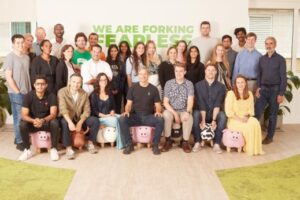Ivy Farm Technologies

Ivy Farm Technologies is an innovative start-up based in Oxford, UK, which is creating real meat from animals, but without the need to grow or farm an animal – ideal for consumers that love meat but are conscious about their impact on the planet and animals. The company’s first product is pork which, compared to traditionally reared pork, has a significantly lower environmental footprint and a comparable nutritional profile. We met with Rich Dillon, CEO, at the American Food Innovate Summit earlier this year and have recently followed up with the Ivy Farm team in the UK to learn more about the exciting work they do.
Ivy Farm was co-founded in 2019 by Dr Russ Tucker and Professor Cathy Ye, who met at Oxford University. Cathy Ye is an Associate Professor from Oxford University, where she is also a member of faculty at the Institute of Biomedical Engineering. Russ Tucker holds a PhD in Biomedical Engineering from Oxford University and was previously a commercial and strategic advisor to supermarkets.

The meat and dairy industry is estimated to account for over 15 percent of all greenhouse gas emissions. It is an industry that emits not only carbon dioxide (CO2), but also methane (CH4) and nitrous oxide (N2O) — both considered to play a similar role to CO2 in driving global warming. Yet, with an ever growing world population, demand for meat is predicted to rise dramatically, and with it, an increasingly detrimental environmental impact.
Ivy Farm believes the solution to the meat problem is meat – cultivated meat. It is identical to traditional meat in taste and its nutritional qualities, but is slaughter-free and has a significantly smaller carbon footprint.
The Ivy Farm manufacturing process adopts advanced tissue engineering techniques. By taking a small number of cells from an animal, placing them in a bioreactor with a carefully crafted blend of vitamins and nutrients, the cells replicate to form cultivated meat in as little as three weeks.
Ivy Farm has built the first and largest pilot R&D facility in the UK, including a 600L bioreactor named Betty. This facility has the capability to produce 2.8 tonnes of cultivated meat a year. Plans to scale-up manufacturing are in progress, with further funding being raised for a large manufacturing plant. The new plant will be able to produce at least 12,000 tonnes of cultivated meat per year and is expected to be located overseas, in a region with a favourable regulatory landscape.
As well as navigating the typical start-up challenges of funding, scale-up and costs, the industry will also have to navigate regulatory challenges.
In late 2020, Singapore became the first country in the world to approve cultivated meat for sale, and the Food and Drug Administration (FDA) issued the green light to two companies for their cultivated meat production processes in the US in late 2022.
We will certainly be watching out for Ivy Farm in the coming months, and keeping our eyes peeled for regulatory successes. We look forward to trying cultivated meat in the not-so-near future!
To find out more about Ivy Farm Technologies, take a look at their website.
Images courtesy of Ivy Farm Technologies